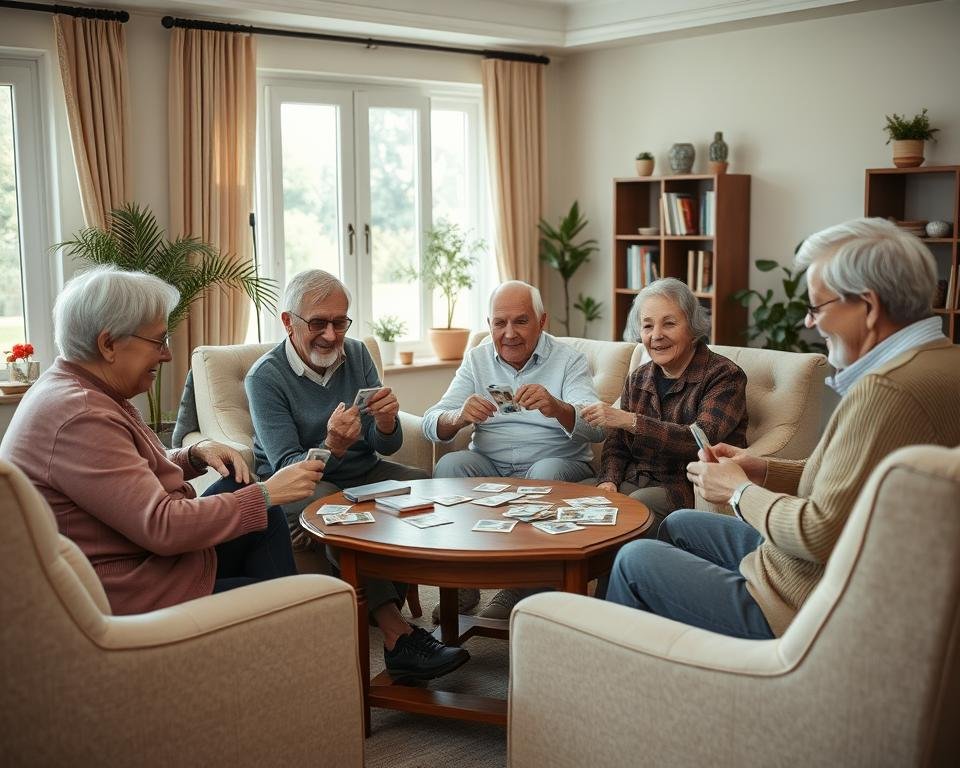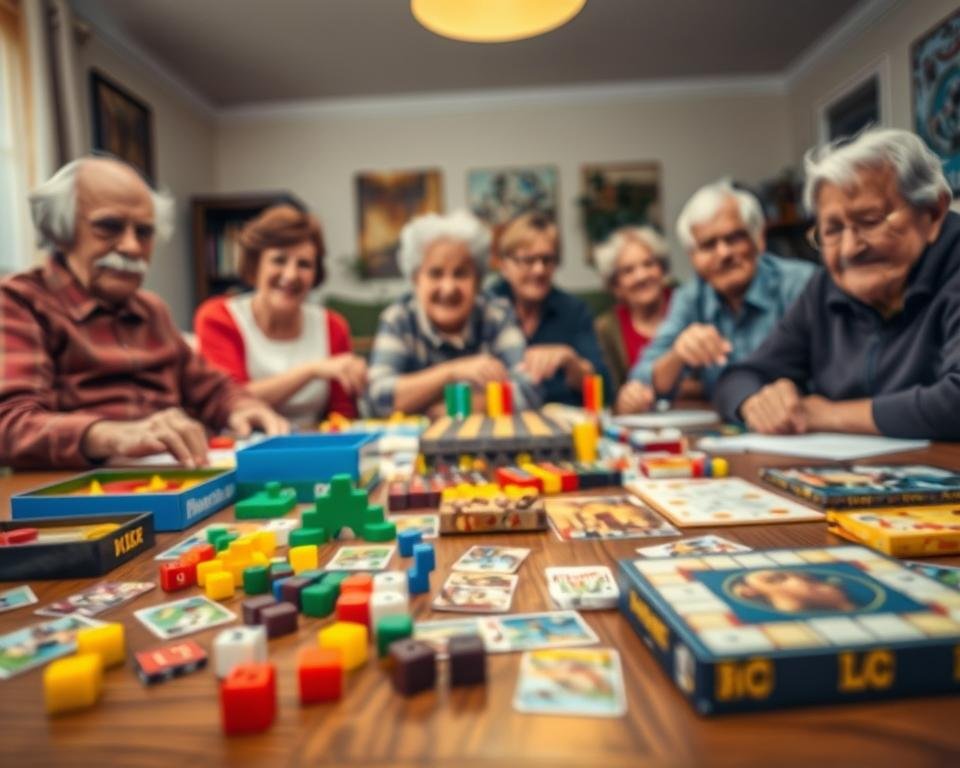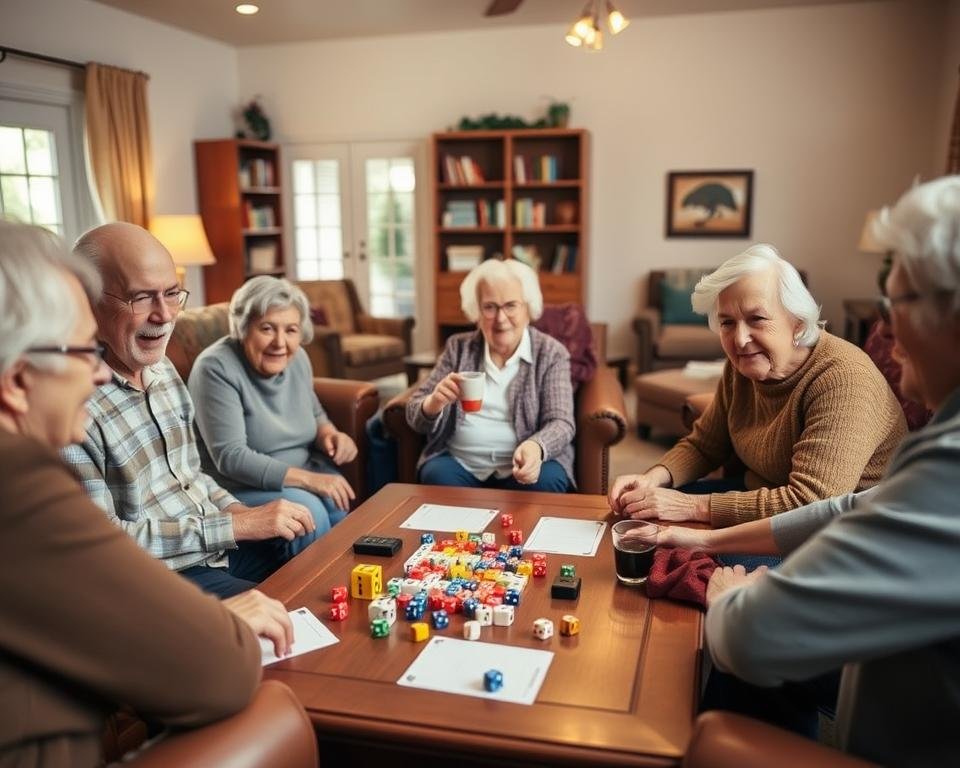“We don’t stop playing because we grow old; we grow old because we stop playing.” – George Bernard Shaw’s timeless words remind us that staying mentally active through engaging activities remains vital at every age.
This guide celebrates how playful challenges keep minds sharp while fostering joy. You’ll find options tailored for various mobility levels and cognitive abilities, proving that age is no barrier to fun. There are many games for old people available today, and these fantastic options not only entertain but also help prevent cognitive decline.
From classic puzzles to modern brain-training apps, these carefully selected games offer more than entertainment. They strengthen memory, improve problem-solving skills, and create opportunities for social connection – crucial elements for older adults seeking fulfilling daily routines. Engaging in games for old people can also enhance everyday life by providing structure and enjoyment.
Whether you prefer solo challenges or group competitions, our diverse list ensures something matches your interests. Let’s explore how strategic play can become your secret weapon for maintaining mental agility and emotional wellbeing.
Key Takeaways
- Playful activities maintain cognitive sharpness and emotional wellness at any age
- Modern and classic options cater to diverse interests and physical abilities
- Most games can be adapted for social interaction and accessibility, making group play an effective way to combat isolation
- Adaptable rules make every challenge accessible and rewarding
- 21 curated options provide fresh ways to stay mentally engaged
Introduction: Why Games Matter for Seniors
Imagine unlocking a treasure chest of mental vitality hidden in your daily routine. Strategic play acts like a multivitamin for the mind, offering benefits that ripple through every aspect of life. Games can support cognitive health and brain health by providing mental stimulation and encouraging activities that keep the mind sharp. Let’s explore how purposeful entertainment shapes cognitive wellness and emotional balance, and how learning new things through games can positively impact different aspects of seniors’ lives.
Setting the Stage for Fun and Mental Stimulation
Think of your brain as a muscle that thrives on regular workouts. Games are a great way to keep seniors’ brains active and engaged, helping to improve memory, concentration, and reasoning. Engaging activities create neural pathways, much like walking trails in a forest. The more you use them, the clearer they become.
Structured play fights monotony by giving days rhythm and purpose. A morning crossword or afternoon card match becomes anchor points in your schedule. These moments of focused challenge sharpen recall and attention span naturally.
Enhancing Your Daily Life Through Play
Creative problem-solving in puzzles sparks innovative thinking for real-world situations. That Sudoku strategy might help you reorganize your pantry more efficiently tomorrow.
Laughter during group activities releases tension like a pressure valve. Shared victories in team challenges build connections that combat loneliness. These activities foster a sense of community and belonging, supporting emotional well-being among participants. Even solo play offers meditation-like focus, pushing daily worries aside temporarily.
The Benefits of Playing Games for Seniors
What if your favorite pastime could shield your mind from aging? Science shows that strategic play offers more than amusement—it strengthens mental resilience. Senior citizens, in particular, can benefit from activities like chess, board games, and digital gaming, as these help improve mental functions, prevent cognitive decline, and reduce feelings of loneliness and depression. Let’s explore how simple activities create lasting cognitive and emotional advantages.

Cognitive Boost and Memory Enhancement
Five minutes of daily puzzles act like a mental power wash. Studies reveal this habit strengthens neural connections, improving recall and focus. Regular engagement with puzzles and games can help mitigate memory loss in seniors, supporting cognitive health as they age. Matching patterns or solving riddles forces your memory to work smarter, not harder.
These challenges mimic real-life problem-solving. Planning moves in chess or organizing puzzle pieces sharpens decision-making skills. Regular practice builds cognitive reserves that help maintain independence longer.
Social Interaction and Emotional Well-being
Laughter erupts naturally during group games for older adults at. Shared victories and friendly rivalries foster bonds that combat isolation. Conversations flow easier when centered around collaborative play.
Joyful moments release stress-relieving endorphins, lifting moods naturally. Achieving small goals—like completing a crossword—builds confidence. Many games also evoke nostalgia, helping seniors recall fond memories and enhancing emotional well-being. These emotional wins create a positive feedback loop, encouraging consistent mental engagement.
Engaging Puzzle and Brain Games
Picture your mind as a vibrant workshop where every challenge sparks new connections. Puzzles act as master keys to cognitive vitality, blending entertainment with measurable mental benefits. Let’s explore how these timeless tools sharpen your skills while calming your nerves.
Jigsaw Puzzles and Abstract Challenges
Jigsaw puzzles remain the gold standard for brain stimulation. Assembling pieces boosts visual-spatial awareness like a mental GPS system. Research shows this activity lowers stress hormones – your heart rate slows as colors and shapes click into place. Working with different shapes in puzzles can further relieve stress and enhance engagement, making the experience both visually stimulating and therapeutic.
Specialized versions support those with memory challenges. Larger pieces with high-contrast images maintain accessibility without sacrificing engagement. Abstract options like Ubongo add thrilling competition, where players race to fit geometric shapes on their boards.
Brain Teasers and Logical Reasoning
Riddles and pattern games act as mental cross-training. They force your thinking muscles to adapt quickly, improving problem-solving flexibility. Regular practice strengthens neural pathways crucial for daily decision-making.
Combine these challenges with targeted brain training exercises for maximum impact. Solo sessions build focus, while group play adds laughter and camaraderie. Whether deciphering logic grids or solving tangrams, each victory reinforces cognitive resilience.
“The satisfaction of snapping that final puzzle piece into place is medicine for the mind,” observes neurologist Dr. Ellen Torres. This blend of achievement and relaxation makes puzzles powerful tools for maintaining mental sharpness at any age.
Creative Board Game Experiences
Your kitchen table transforms into a gateway for adventure when board games enter the scene. These tactile experiences blend social connection with mental challenges, creating moments that linger long after the last piece moves.
For seniors, playing board games offers valuable opportunities for social interaction, cognitive engagement, and entertainment, making games like chess, backgammon, and other tabletop classics especially beneficial.

Classic Choices: Chess, Checkers, and Cluedo
Chess turns every match into a battle of wits. You’ll strategize like a general, anticipating moves while protecting your king. Checkers simplifies the formula without losing depth—its jump-or-be-jumped tension keeps your focus razor-sharp.
Cluedo adds detective drama to your game nights. Since 1949, players have relished accusing Colonel Mustard in the conservatory with a wrench. This whodunit classic trains deductive reasoning through clever clue elimination.
Modern Favorites: Ticket to Ride and Dixit
Ticket to Ride reshapes geography into friendly competition. Claim railway routes from Paris to Istanbul while blocking opponents’ plans. The strategy lies in balancing short-term gains with long-term route goals.
Dixit sparks imagination through surreal artwork. Describe a card using metaphors, then watch others guess your meaning. This modern gem proves board entertainment thrives on creativity as much as logic.
Classic Card Games to Enjoy
Feel the satisfying snap of cards shuffling between your hands—a sound that’s echoed through centuries of strategic play. These portable pastimes turn any table into an arena for mental agility, blending tradition with modern accessibility. Card games are enjoyable for seniors of all skill levels, offering a fun and rewarding way to connect and stay mentally active.
Timeless Games: Gin Rummy, Old Maid, and UNO
Gin Rummy sharpens your tactical thinking like a mental whetstone. Organize sets and sequences faster than your opponent to declare victory. The thrill lies in balancing quick decisions with long-term strategy.
Old Maid delivers laughter-filled suspense as you avoid holding the unmatchable card. Its simplicity makes it perfect for mixed-skill groups. Modern decks often feature whimsical themes to spark conversations.
UNO’s vibrant colors and action cards create dynamic gameplay. Reverse turns, skip opponents, or make them draw extra cards. The game involves matching tiles—cards—by color or number, making it accessible and fun for all ages. The game evolves rapidly, keeping your attention locked on every played card.
Solo Play: The Variety of Solitaire
Solitaire transforms quiet moments into productive brain workouts. The game is designed for one player, making it ideal for solo enjoyment. Choose from Klondike’s classic layout or Spider’s complex eight-suit challenges. Each version tests pattern recognition and patience differently.
Adaptive decks with jumbo print or textured backs enhance accessibility. “Card games meet you where you are,” notes occupational therapist Mara Jensen. Play becomes both therapy and entertainment when tailored to individual needs.
From 9th-century Chinese paper decks to today’s specialized designs, these card game traditions prove enduring appeal. Whether competing or reflecting solo, you’ll find fresh challenges in every shuffle.
Exciting Dice Games for Real-Time Fun
The clatter of dice across a table signals more than just chance—it’s an invitation to sharpen your wits. The anticipation and excitement of watching the dice land adds to the thrill of gameplay, making each roll a moment of suspense. These portable game essentials fit in your pocket yet deliver hours of strategic entertainment. All you need is a flat surface and willing players to spark lively competition.

Competitive Dice Rolls: Yahtzee and Liar’s Dice
Yahtzee turns probability into art. Shake five dice in a cup, then strategize which combinations to chase—full houses or straight runs? Each roll demands quick math skills and adaptability. Players aim to beat their opponents by achieving the highest scores through clever choices and a bit of luck. The thrill peaks when you yell “Yahtzee!” after landing five matching numbers.
Liar’s Dice adds psychological warfare to the mix. Conceal your dice cup while bluffing about your results. Can you spot when opponents stretch the truth? This game rewards poker-faced deception as much as lucky throws.
Challenging Rounds and Fast-Paced Action
Dice create instant suspense with every toss. Will this roll complete your sequence or force a risky gamble? The element of chance keeps matches unpredictable, letting newcomers compete evenly with seasoned players.
Quick rounds fit perfectly into coffee breaks or family visits. Rotate turns rapidly to maintain energetic momentum. Players may need to pass the dice quickly to keep the game moving and everyone engaged. Laughter erupts when improbable rolls defy expectations, proving that fun needs no complicated rules.
These timeless activities prove that great competition thrives on simplicity. Whether you’re calculating odds or calling bluffs, every shake of the cup brings fresh opportunities for connection and mental stimulation.
Word Games to Enhance Your Language Skills
Your vocabulary becomes a playground where every session strengthens mental agility. These linguistic challenges offer more than entertainment—they’re stealth workouts for your verbal intelligence. A wide range of fun games, from classic word puzzles to interactive group activities, can be played to enhance language skills and keep learning enjoyable.
Crosswords, Hangman, and Boggle for Quick Thinking
Crossword puzzles act as mental calisthenics. Start with Monday’s easy clues and progress to Saturday’s cryptic stunners. Each solved square reinforces memory pathways while expanding your word bank.
Boggle transforms letters into a race against time. Shake the grid, spot hidden terms, and outscore opponents. It’s like speed-reading through alphabet soup—great for sharpening pattern recognition.
Hangman brings laughter to spelling practice. Guess letters before the stick figure completes—ideal for family gatherings. You’ll learn obscure words while bonding over near-misses. Tic tac toe is another simple and accessible game for seniors, offering classic fun and mental engagement without the need for special equipment.
Creative Rounds with Articulate
Articulate turns descriptions into thrilling team sport. Describe “elephant” without saying “trunk” or “gray” in 30 seconds. Watch partners guess correctly through creative clues, sparking hilarious “aha!” moments.
This game proves communication isn’t just about words—it’s about making mental connections. Regular play improves verbal fluency and listening skills simultaneously.
Neurologist Dr. Ellen Torres notes: “Language-based activities light up multiple brain regions like fireworks.” Whether solving solo puzzles or hosting lively game nights, you’re building cognitive reserves one word at a time.
Number and Logic Games for Strategic Thinking
Strategic number play transforms math into a thrilling mental adventure. These activities offer structured challenges that sharpen analytical skills while keeping entertainment value high. The aim of these games is to solve problems and achieve specific goals, making each session purposeful and rewarding. For those who prefer patterns over prose, numerical puzzles provide perfect cognitive workouts.
Sudoku and Battleships for Mental Arithmetic
Sudoku’s magic lies in its elegant simplicity. Each 9×9 grid becomes a dance of digits where every row, column, and 3×3 box must contain numbers 1-9. Start with beginner puzzles to build confidence, then tackle expert levels that demand advanced pattern recognition.
Battleships turns probability into naval warfare. The game is usually played by two players, who take turns trying to locate each other’s ships. Plot coordinates to locate hidden ships while disguising your fleet. This classic evolved from paper grids to tactile boards, perfect for face-to-face competition. Each guess strengthens mental math skills through calculated risk-taking.
Regular practice with these challenges boosts memory retention and cognitive recall. Studies show number-based activities activate multiple brain regions simultaneously. Older adults often find these structured puzzles particularly satisfying—they provide clear goals with measurable progress.
Whether you prefer solitary Sudoku sessions or head-to-head Battleship duels, these logic games prove mathematics can be playful. They transform abstract concepts into tangible victories, one correctly placed number or strategic strike at a time.
